|
|
|
Sort Order |
|
|
|
Items / Page
|
|
|
|
|
|
|
| Srl | Item |
| 1 |
ID:
034511
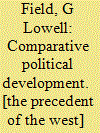

|
|
|
|
|
| Publication |
London, Routledge & Kegan Paul Ltd., 1967.
|
| Description |
xi, 247p.
|
|
|
|
|
|
|
|
|
|
|
|
Copies: C:1/I:0,R:0,Q:0
Circulation
| Accession# | Call# | Current Location | Status | Policy | Location |
| 001238 | 320.3/FIE 001238 | Main | On Shelf | General | |
|
|
|
|
| 2 |
ID:
141454
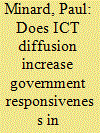

|
|
|
|
|
| Summary/Abstract |
Numerous scholars have suggested that ICT diffusion may lead to more responsive governance in China. To date, however, few empirical studies have been made of the political implications of China's Internet, and previous studies of the association between citizen access to information and government responsiveness have focused on democratic contexts, relying on electoral mechanisms as explanations for the observed positive relationship. This article investigates ICT diffusion and government responsiveness in China by examining data on the composition of government spending. Results indicate that increasing ICT diffusion is associated with a higher proportion of provincial government spending devoted to health and education, and a lower proportion devoted to capital construction. A collective action mechanism is proposed as a potential driver of these results.
|
|
|
|
|
|
|
|
|
|
|
|
|
|
|
|
| 3 |
ID:
133674
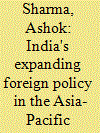

|
|
|
|
|
| Publication |
2014.
|
| Summary/Abstract |
A major feature of India's foreign policy in the post-Cold War era has been its increasing economic, political and strategic engagement with the Asia-Pacific region, a process that began in the 1990s as India's "Look East Policy". However, New Delhi's eastward expansion, despite sharing many commonalities with New Zealand, has not yet resulted in any substantial relationship with Wellington, be it in the field of politics, economic or defence/security. Despite attempts taken in the last two decades, India's engagement with New Zealand in terms of overall bilateral relationship is still untapped. There is ample scope for these two countries to collaborate and engage themselves in a wide-range of issues encompassing economic, political and strategic aspects of their bilateral relationship, with focus on a closer security partnership to deal with the emerging challenges from traditional and non-traditional threats in the region.
|
|
|
|
|
|
|
|
|
|
|
|
|
|
|
|
| 4 |
ID:
132738
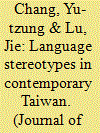

|
|
|
|
|
| Publication |
2014.
|
| Summary/Abstract |
We collected original experimental data, using the matched-guise technique, to examine the Taiwanese people's evaluational reactions to two major spoken languages in contemporary Taiwan: Mandarin and Taiwanese. Taking advantage of the effectiveness of the experimental technique in controlling for possible unobserved confounding variables, we clearly and systematically demonstrate that (1) language stereotypes do exist in today's Taiwan, and (2) there are some serious and significant implications for Taiwan's public opinion and democratic politics. Our data show that such language stereotypes are of great salience and consistently decoded for political issues, less so for socioeconomic issues, and almost insignificant for personality features. Our data also confirm that these language stereotypes are not just proxies of Taiwan's regional divisions; the Taiwanese people cognitively differentiate between the spoken languages' political and socioeconomic implications (despite some mild halo effect between the two).
|
|
|
|
|
|
|
|
|
|
|
|
|
|
|
|
| 5 |
ID:
103988
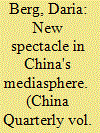

|
|
|
|
|
| Publication |
2011.
|
| Summary/Abstract |
This study offers a cultural reading of the web-based reality show Soul Partners (2007) from Shanghai. Soul Partners serves as a case study to explore how 21st-century Chinese cultural discourse debates the transformation of urban society in China, providing insight into the Chinese cultural imagination, perceptions of the globalizing metropolis and the impact of consumer culture. This reading positions Soul Partners within the discursive context of Chinese popular, postmodern and post-socialist culture and in relation to the cultural import of the reality show genre into China's mediasphere. Analysis focuses on the quest for authenticity in the Chinese discourse on perceived reality and the way Soul Partners generates new urban dreams for China's Generation X. The analysis of Soul Partners sheds new light on the dynamics of transcultural appropriation in a globalizing China and the social and political implications.
|
|
|
|
|
|
|
|
|
|
|
|
|
|
|
|
| 6 |
ID:
094235
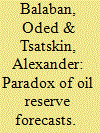

|
|
|
|
|
| Publication |
2010.
|
| Summary/Abstract |
In the light of the outstanding importance of hydrocarbons for global energy, the controversy over peak oil has become both pressing and emotionally charged. Two conflicting parties - alarmists and optimists - hold irreconcilable positions. The shaping of the future energy policy is presently based on modeling results and geological considerations only. We show that the existing predictions of the energy crisis are increasingly mixed-up with value-judgments. The value analysis of those forecasts allows us to suggest that at least part of the estimations are implicit reflections of predictors' ends and values, and do not demonstrate a real ability to anticipate future conditions. Paradoxically, the question of oil reserves depletion is better understood when predictions are viewed as an instrument to impose the predictors' values and intervene in the currently bustling oil market. The intervention in the oil prices may occur in either direction becoming a tool to justify values rather than an instrument for the acquisition of knowledge.
|
|
|
|
|
|
|
|
|
|
|
|
|
|
|
|
| 7 |
ID:
184874
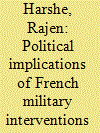

|
|
|
| 8 |
ID:
131633
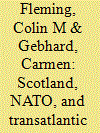

|
|
|
|
|
| Publication |
2014.
|
| Summary/Abstract |
This article explores the political and strategic implications of Scottish Independence for existing transatlantic security arrangements. It examines the potential institutional, legal and political obstacles Scotland might face during the transition to independence and discusses the specific challenges in the area of security and defence, including the nuclear issue and the question of what form an independent Scottish Defence Force (SDF) would need to take to allow and facilitate integration in transatlantic security structures. It argues that a number of strategic and political issues could be mitigated in the course of negotiations between Edinburgh and London. Moreover, Scotland's geostrategic position and political orientation make it an important prospective partner in international security cooperation across the Eastern Atlantic, High North and North Sea, which suggests that an advanced partnership with NATO, and eventually full membership, seems like an option that is both politically viable and more likely than any scenario that predicts seeing an independent Scotland (IS) outside these structures. This challenges some of the main strategic and security political arguments against independence and thus seeks to spark a debate about the realistic options for Scotland should it become independent after 2016.
|
|
|
|
|
|
|
|
|
|
|
|
|
|
|
|
| 9 |
ID:
171335
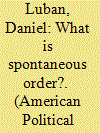

|
|
|
|
|
| Summary/Abstract |
Due especially to the work of Friedrich Hayek, “spontaneous order” has become an influential concept in social theory. It seeks to explain how human practices and institutions emerge as unintended consequences of myriad individual actions, and points to the limits of rationalism and conscious design in social life. The political implications of spontaneous order theory explain both the enthusiasm and the skepticism it has elicited, but its basic mechanisms remain elusive and underexamined. This article teases out the internal logic of the concept, arguing that it can be taken to mean several different things. Some are forward-looking (defining it in terms of present-day functioning), whereas others are backward-looking (defining it in terms of historical origins). Yet none of these possibilities prove fully coherent or satisfactory, suggesting that spontaneous order cannot bear the analytical weight that has been placed on it.
|
|
|
|
|
|
|
|
|
|
|
|
|
|
|
|
|
|
|
|
|